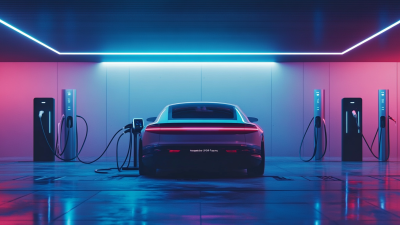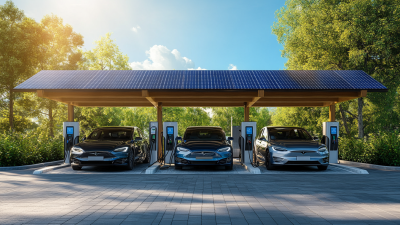As the automotive industry transitions towards a more sustainable future, Business Electric Vehicle Charging solutions have emerged as a crucial component in supporting this paradigm shift. According to a report by the International Energy Agency, the global electric vehicle (EV) stock surpassed 10 million units in 2020, and it is projected to reach 145 million by 2030. This rapid growth underscores the need for businesses to adapt their infrastructure to facilitate the increasing adoption of EVs. Implementing efficient Business Electric Vehicle Charging solutions not only enhances the convenience for employees and customers but also aligns with corporate sustainability goals, potentially reducing greenhouse gas emissions significantly. In this blog, we will explore the top strategies for leveraging these charging solutions, highlighting five key advantages that can propel your business towards a greener and more profitable future.

The rising demand for business electric vehicle (EV) charging solutions is undeniably transforming the automotive landscape in 2023. The global battery-as-a-service market, valued at $1.14 billion in 2022, is projected to grow to $1.37 billion in 2023, eventually reaching a staggering $53 billion by 2030. This growth reflects a robust shift towards sustainable transportation, driving businesses to invest in EV charging infrastructure.
In addition to this, the EV charging station market is anticipated to expand from $23.8 billion in 2024 to an estimated $812.9 billion by 2037, showcasing a compound annual growth rate (CAGR) of 31.2% during the forecast period. As companies embrace electric commercial vehicles (ECVs) to decrease their carbon footprints, the commercial vehicle charging market is expected to witness an impressive CAGR of around 28.1%.
Tip: Businesses should assess their current charging infrastructure and consider partnerships with charging solution providers to enhance their sustainability efforts. Tip: Investing in smart charging technologies can optimize energy use and reduce operational costs while supporting your commitment to eco-friendly practices.

As businesses increasingly focus on sustainability, implementing electric vehicle (EV) charging solutions emerges as a pivotal strategy. These systems not only facilitate a smooth transition to electric fleets but also significantly reduce carbon footprints. By integrating charging stations, companies create a supportive environment for employees and customers who prioritize eco-friendly practices. This shift towards electric mobility not only garners positive public perception but also aligns with global sustainability goals.
Moreover, offering EV charging options enhances corporate responsibility, showcasing a commitment to reducing greenhouse gas emissions. As the demand for electric vehicles rises, businesses can attract environmentally conscious consumers and employees while positioning themselves as leaders in sustainable practices. This not only boosts brand reputation but can also result in long-term cost savings, as electric vehicles often have lower operational costs compared to traditional ones. In fostering a greener future, companies that adopt electric vehicle charging solutions win on multiple fronts, from sustainability to business efficiency.

Electric vehicle (EV) charging stations are becoming
an essential component for businesses looking to cut down on operational costs while contributing to
a sustainable future. According to a report by the
International Council on Clean Transportation,
companies can save up to 20% on fuel costs by switching
to electric fleets. This not only helps in reducing expenditure but also positions businesses
to take advantage of numerous financial incentives provided by local and federal governments. For instance,
the U.S. government offers tax credits of up to $30,000 for the installation of
commercial EV charging equipment, which significantly enhances the return on investment.
Additionally, as the demand for EVs continues to surge—projected to reach 30%
of all vehicle sales by 2030—companies equipped with charging infrastructures can attract
eco-conscious customers and employees. A survey from Deloitte
indicates that 83% of consumers are more likely to patronize businesses
that prioritize sustainability. By investing in EV charging solutions, businesses not only decrease costs and qualify for incentives
but also strengthen their brand image in a market increasingly focused on green initiatives.
As electric vehicle (EV) ownership continues to surge, the demand for convenient charging solutions in business environments has become paramount. A recent report indicates that over 70% of EV owners consider access to charging stations a significant factor when choosing where to work or stay. This trend illustrates not only the necessity of EV charging infrastructure but also its role in attracting and retaining eco-conscious customers and employees. By incorporating EV charging stations, businesses can position themselves as environmentally responsible, appealing to a growing demographic of eco-aware consumers who prefer brands aligning with their sustainability values.
Hotel chains, in particular, are recognizing the importance of EV charging as an essential amenity. Studies suggest that hotels equipped with charging stations can increase their occupancy rates by up to 20%, catering to guests who prioritize sustainability in their choices. Furthermore, businesses that establish robust EV charging facilities are likely to foster loyalty among employees, especially as discussions around "climate quitting" become more prevalent. Providing such services not only meets a critical need but also builds trust and enhances employee satisfaction, ultimately leading to improved retention and a stronger company culture.
As businesses embrace electric vehicles (EVs), understanding the regulatory landscape becomes crucial. Compliance with local, state, and federal regulations not only ensures legal operation but also positions companies to take full advantage of available funding opportunities. Governments are progressively offering incentives to promote EV adoption, such as grants, tax credits, and rebates for installing charging infrastructure. By staying informed about these incentives and adhering to regulations, businesses can significantly reduce the initial costs associated with implementing EV charging solutions.
Navigating compliance involves a keen awareness of various regulations that may vary by region. Companies must consider building codes, zoning laws, and environmental standards when planning their charging stations. Moreover, engaging with local authorities early in the process can facilitate smoother installation and operation. By proactively addressing regulatory requirements, businesses not only mitigate risks but also enhance their sustainability image, which can attract eco-conscious consumers and investors. Understanding and leveraging these funding opportunities will enable businesses to integrate EV charging solutions effectively and contribute to a greener future.
| Advantage | Description | Compliance Focus | Funding Opportunities |
|---|---|---|---|
| Sustainability | Reduces carbon footprint and promotes green business practices. | Ensures compliance with emissions regulations. | Access to state and federal grants for green initiatives. |
| Cost Savings | Lower operational costs compared to traditional fuel vehicles. | Meets energy efficiency requirements. | Incentives for EV infrastructure installation. |
| Employee Benefit | Attracts talent by offering EV charging as an employee perk. | Aligns with corporate social responsibility (CSR) goals. | Tax deductions for providing EV charging stations. |
| Increased Foot Traffic | Attracts customers who drive electric vehicles. | Fulfills local development requirements for public charging. | Funding from local governments for public access charging stations. |
| Future-Proofing | Prepares businesses for the shift towards electric mobility. | Adheres to future regulatory changes in vehicle emissions. | Support for innovative EV solutions from public grants. |






